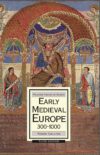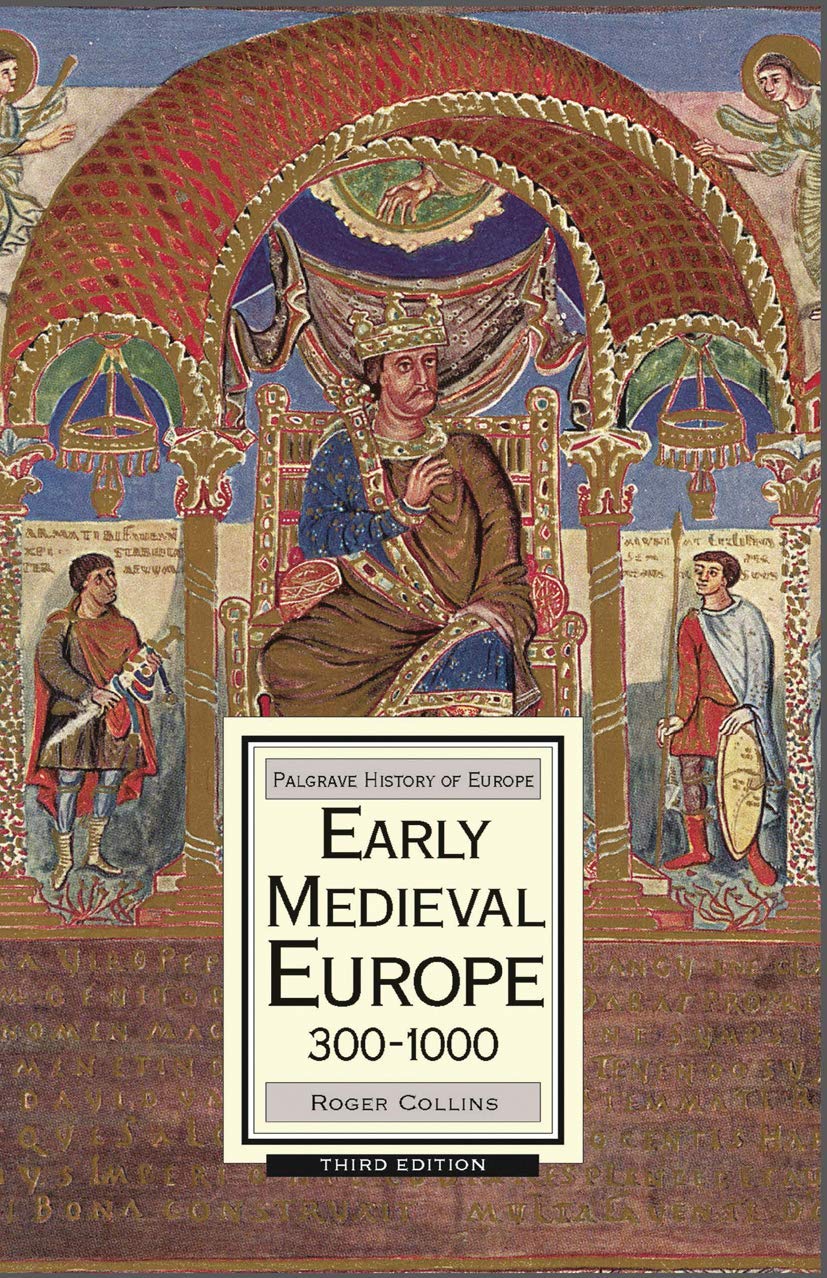
$130.00
Early Medieval Europe, 300-1000 by Roger Collins Price comparison
Early Medieval Europe, 300-1000 by Roger Collins Price History
Early Medieval Europe, 300-1000 by Roger Collins Description
Discover Early Medieval Europe, 300-1000 by Roger Collins
Step back in time with “Early Medieval Europe, 300-1000” by Roger Collins. This comprehensive hardcover book offers a detailed exploration of one of history’s pivotal eras. Ideal for students, educators, and history enthusiasts alike, it provides a rich narrative on the transformations that defined early medieval Europe.
Key Features and Benefits
- In-Depth Analysis: This edition presents an extensive analysis of political, cultural, and social changes that took place during early medieval times. Understanding these shifts is crucial for anyone keen on European history.
- Authoritative Insight: Roger Collins, a respected historian, brings his expertise to the narrative. Readers will gain insights from his scholarly research and perspective, ensuring a solid foundation in medieval studies.
- Comprehensive Coverage: Spanning 556 pages, this book covers a wide-ranging timeline from 300 to 1000 AD. Discover the events that shaped modern Europe, from the fall of the Roman Empire to the rise of new kingdoms.
- Quality Hardcover Edition: The durable hardcover format not only enhances the reading experience but ensures longevity. The dimensions of 8.5 x 5.6 x 1.3 inches make it a practical choice for libraries, classrooms, or personal collections.
- ISBN Details: With its unique ISBN-10: 0230006728 and ISBN-13: 978-0230006720, it is easy to locate this book within catalogues or while searching online.
Price Comparison Across Suppliers
When searching for the best deals on “Early Medieval Europe, 300-1000,” it’s essential to compare prices from various suppliers. Currently, prices can vary significantly depending on the retailer. We provide a comprehensive price comparison feature that helps you identify the best deals available online.
Whether you prefer purchasing from major outlets or specialized bookstores, our platform ensures you won’t miss out on competitive prices. Check back frequently, as prices can fluctuate based on demand and inventory.
6-Month Price History Trends
Our 6-month price history chart reveals interesting trends regarding “Early Medieval Europe, 300-1000.” Over the past months, the price has seen slight fluctuations, with occasional spikes reflecting increased interest during academic seasons. Tracking such trends helps buyers make informed purchasing decisions, ensuring you secure the best value.
Customer Reviews Overview
Customer feedback on “Early Medieval Europe, 300-1000” highlights its strengths and areas for improvement. Many readers praise Collins’ clear writing style and ability to engage the audience with compelling narratives. The extensive coverage of the era and its significant events is also frequently mentioned as a highlight.
However, some readers note that the depth of information may be overwhelming for newcomers to medieval studies. A few have expressed a desire for more maps and visuals to accompany the rich text, which could enhance the learning experience.
Unboxing and Review Videos
For those looking to gain more insight into “Early Medieval Europe, 300-1000,” various YouTube review and unboxing videos are available. These resources visually showcase the book’s quality and provide additional context through expert reviews. Exploring these videos can further enrich your understanding of the content and guide your purchase decision.
Explore More About Early Medieval Europe
With its comprehensive examination of early medieval history, “Early Medieval Europe, 300-1000” is not just a mere academic text, but a vital tool for anyone interested in understanding the foundations of modern Europe. Whether you’re a student preparing for exams or a learner with a passion for history, this book is a must-have in your collection.
Compare prices now to find the best deals that suit your needs. Don’t miss out on the opportunity to own this essential work of historical scholarship!
Early Medieval Europe, 300-1000 by Roger Collins Specification
Specification: Early Medieval Europe, 300-1000 by Roger Collins
|
Early Medieval Europe, 300-1000 by Roger Collins Reviews (10)
10 reviews for Early Medieval Europe, 300-1000 by Roger Collins
Only logged in customers who have purchased this product may leave a review.








David Hébert –
Loved it. As an amateur, it’s a good introduction. English is not even my language and it was easy to comprehend.
E.J. Kaye –
A detailed yet readable history of a time often ignored. From the ‘fall’ of Rome to the Crusades, crucial systems of religion, government and agriculture were formed amid the chaos of barbarian invasions and insurgent Islam.
This book explains the times from many perspectives, and uses the latest anthropological evidence as well as discerning scholarship to arrive at solid conclusions. The text is not overly difficult to digest, and I believe will be useful to the scholar as well as the general reader.
David Taylor –
I don’t like writing reviews. This product was fine.
Awesome Book! Great Service! –
I needed this book in a hurry for school. Nobody else had it so I had no choice but to order it online. I was kind of nervous because I did not know when it would come in. I was really glad that it came in only four days after ordering it.
Amazon Customer –
I’d read several more or less thematic histories of Late Antiquity and the Early Middle Ages, and while my knowledge of the basic narrative for the West up to about 500 was good (the usual political and military history, the historiography, and the other evidence), I was a bit unclear on 500-1000. To prep for some interesting thematic histories of that period, I needed the basics of “what happened.” So, I decided to read Collins.
It’s a good, basic history, but I certainly wouldn’t want to rely on it as the only secondary work on the periods and places that interest me most. At its heart, its really an old fashioned narrative history. Collins relies a great deal on historiography, gives sometimes too lengthy accounts of their reliability and reconcilability, and lays out the politics and hack and slash of Early Medieval Europe quite competently. There are, happily, sections of culture and wider historical movements. There are also, unhappily, a few methodological diatribes and excesses with respect to the minute details of military campaigns and ephemeral rulers or would-be rulers. As to the latter, the play by play of the wars of various Frankish rulers and much of the account of the kingdoms of Northern Spain are prime examples. It’s too easy to lose site of the forest for the trees in such sections, and a 700-year wide forest requires some focus to apprehend.
The detail with which he treats the nature of his historiographical sources really only makes sense, if one assumes the reader will eventually venture more deeply in certain areas. So, I think Collins himself saw the work as a basic handbook and introduction to this wide world. I give it 4 stars instead of 5 mostly for the forest-amnesia noted above, as well as his somewhat outdated focus on historiography.
franks –
A useful introduction for students and general readers to aid understanding of Europe’s complex medieval history, especially the later well-documented periods. However the early Barbarian formation of the individual countries and states is based on scant historical evidence, and could benefit from an update to include the latest genetics, archaeological research etc. Indeed in this respect the settlement pattern seen as data plots along the Roman roads depicted in http://fchknols.wordpress.com, suggest trade may have been important in establishing the variety of languages of this region.
Red Horde –
This book concentrates on the political aspects of the early Middle Ages at a scholarly level. What I was really looking for was a book on the early Middle Ages that discusses broader aspects of ‘every day life’ during that epoch at a more ‘general reader’ level.
Jorge Doehner –
Excelent scholarly work, well documented, easy to read. The perfect book to position and understand the major players (people’s) during that age, and from there proceed to in-depth study of the ones that interest you the most. be that Goths, Thuringii, Alamani, Vandals, Alan’s, Franks, Lombards, Huns, etc., all viewed in perspective to their relationship and involvement with the Roman Empire.
James Kenney –
Do not buy this book unless you are seriously interested in the history of medieval Europe. That said, if you are this is quite a good book. I’ll summarize my thoughts into pros and cons, since there are several of each.
PROS: The best thing about this book is its inspired structure. It is not organized in a narrative way. Instead it is organized geographically/politically. Each region of Europe is examined separately, and bite-size chunks of the history of how that region evolved from the later Roman Empire into feudal Europe. The treatment of the various areas are handled so that material learned from study of a previous area, is germane to this process in another region. Another plus is that non-European areas are discussed, as their divergent interests led to conflict with a European entity. For example, the constant struggle between the Byzantine Empire and the Sassanid dynasty of Persia is discussed a number of times, and in detail at least once.
Another pro is the careful attention our historian pays to analyzing our sources, and especially the biases of their authors, without hesitating to indicate his personal opinion about their reliability. Sources and evidence are everything to a historian, and those who do not consider the motives behind the recording of a version of history, are simply not doing their job. The skill and objectivity Roger Collins brings to this task is impressive, and convincing. When he is unsure, which is often, given the tenuous evidence we have about this difficult period, he does not hesitate to say so, and he explains why he is unsure.
Finally, this book refutes the general view of this period, that it was the “Dark Ages.” An ongoing thesis Collins discusses is how the collapse of the Western Empire’s borders led to a diffusion of Roman knowledge and literature to a much farther extent than previously. Indeed, all our extant Latin manuscripts come down to us through the Franks, in large part courtesy of the Church. This helps dispel the myth that much of what we know about ancient Mediterranean society comes to us from Arabic preservation of ancient manuscripts. This is true of Greek manuscripts, but not of Latin ones, which were preserved by the Merovingians and the Carolingians.
CONS: First, the font is tiny; there are 45 lines of print per page. Second, Collins, while a wonderful historian is not mellifluous. Here is a sentence chosen from a page picked at random: “The region they targeted was Frisia, the flat, marshy land between the Rhine and the North sea, whose inhabitants were noted for their maritime and trading activities and who had contributed a distinctive element to the Germanic settlement in the post-Roman period, but who had so far resisted both Frankish political overlordship and conversion to Christianity.”
There is a lot to unpack from this sentence, and it required more than one attempt to unpack it. Thus, this 434 page history is more nearly the equivalent of a 600 page less challenging text.
None-the-less, this is a small price to pay for the insights and understanding set forth in this amazing book.
DR ROBERT BATES –
A well-written and concise summary of the period which uses recent interpretations. An ideal text for newcomers to the field whilst also offering new twists to more experienced readers.